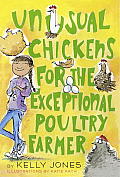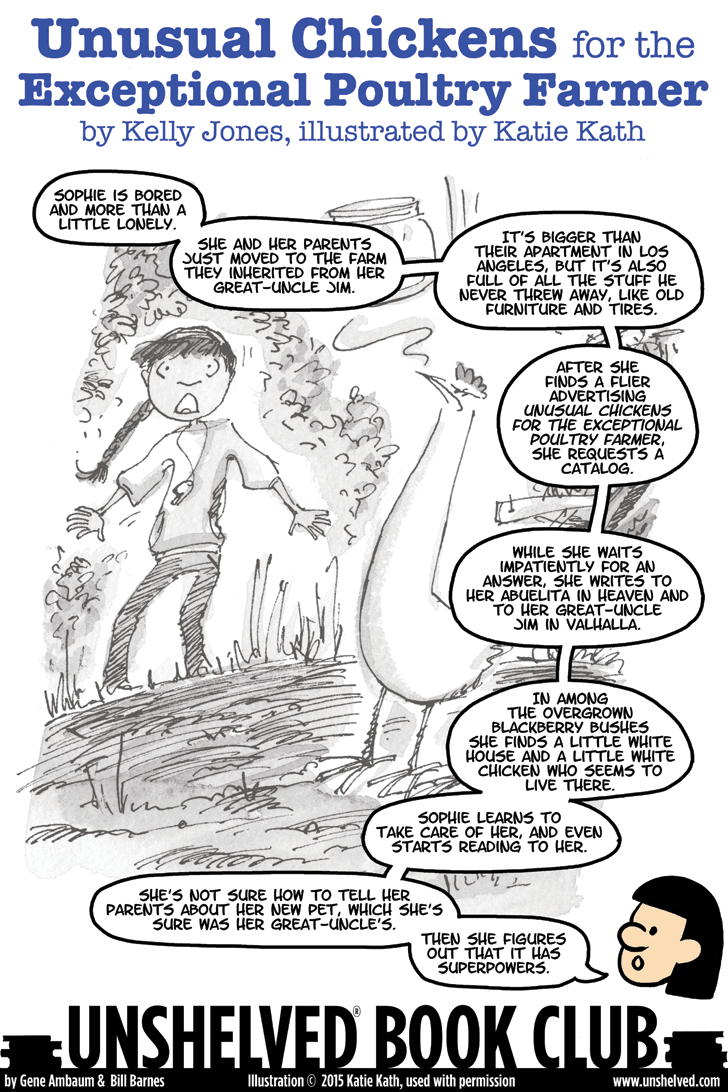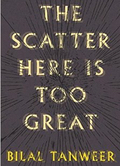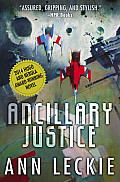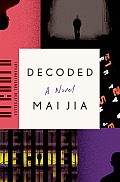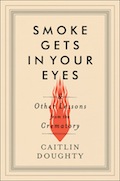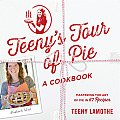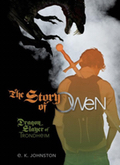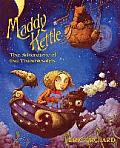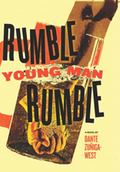Link to this review in the form of a comic strip by geneambaum tagged coming of age
Link to this review by wally tagged literary
Interlocking stories about a number of ordinary Pakistanis converge and diverge from a train station bombing in the city of Karachi. A middle-aged writer recounts how his father used to take him around the city and tell him elaborate stories, sometimes completely invented, and sometimes about the people they met (including an old Communist poet who is a dear friend of the father). A young man steals his mother’s car so he can pick up a young woman for an unchaperoned date, but when they get stuck in traffic and he sees his grandfather, the old Communist poet, he avoids the old man and, inadvertently, the train station blast. A woman tells her little brother fairy tales of kings and sorceresses, but hides her own clandestine affair with a young man who uses her and drops her and later goes on to become a repo man. (He dies in the bombing.) An ambulance driver brings people and bodies to the hospital after the blast, including the body of the repo man, and suffers a deep spiritual crisis..
Why I picked it up: I was intrigued by the premise of a bombing acting as a uniting force in the lives of some ordinary people.
Why I finished it: The characters fascinated me, especially because their stories begin or end at the moment of the blast. The young man tells of his father and how his father’s father, the Communist poet, ruined the family by pitting his ideals against the reality of being in a family. After the blast he realizes that he has also hurt his family by continuing to battle against his father and grandfather and their idealistic, contrary, approaches to life. The repo man ruined his girlfriend’s life, but he hardly remembers her, except at the moment of the bombing when he considers how pure her love for him was.
Readalikes: Virginia Woolf’s classic, Mrs. Dalloway, which tells the story of a single day in London and how the lives of a few Londoners intersect, even at a distance.
Link to this review by wally tagged science fiction
Breq, the last remnant of an AI once known as the troop ship Justice of Toren, travels to an icy planet. She is seeking a collector of priceless objects, in the hopes of gaining possession of a weapon that will allow her to avenge the deaths of some natives of a newly annexed planet, who were killed around the same time Justice of Toren was destroyed.
In a frozen street, Breq comes across a person who was beaten and left to die. She helps Streivarden, and discovers that the person was once her captain, long ago, and her plans for revenge must change.
Why I picked it up: Gene gave this book to me and said I’d love it, and he hoped I’d be able to summarize the complex plot. Also it won major awards like the Hugo and Nebula. Enough said.
Why I finished it: I loved this book. It alternates between points of view and time periods as Breq’s memories from the annexed planet reveal the reasons for her current desire to assassinate Anaander Mianaai, Lord of the Radch civilization. In particular, the long-ago story shifts points of view as it is narrated by the bodies (ancillaries) taken over by Justice of Toren’s multi-perspective AI, though it is largely told from the perspective of a single ancillary, One Esk. The characters have their own motivations, whether it is Streivarden, completely alone after being in stasis for a thousand years, One Esk, who seems to be trying to determine if it has any free will, or Anaander Mianaai, who also exists across multiple bodies in order to manage a galactic empire.
Readalikes: My first impression was immediately of two books: Ursula LeGuin’s classic The Left Hand of Darkness with its deep concern for how gender is perceived and portrayed. Breq is often confused by the icy planet’s language, and the way gender is determined and referred to there. And it reminded me of Samuel Delaney’s Stars in My Pocket Like Grains of Sand because both have a massive scale and minute descriptions of personal and cultural practices.
Link to this review by robert tagged thriller
It may be advertised as a thriller, but this suspenseful first novel by Mai Jia, a former People’s Liberation Army intelligence worker, takes on many other dimensions. It is a tale of the awesome physical and information security surrounding a code breaking operation, and of the political turmoil in the People’s Republic of China throughout the twentieth century. It focuses on Rong Jinzhen, the scion of a family of patriotic mathematicians, an impractical genius with unlikely mentors, a neglected young man in fragile health who possesses a ferocious will to succeed. He is diverted from his highly regarded work on computers at the dawn of the electronic age and disappears into the hidden world of code breaking.
Why I picked it up: I check my library for new books about codes and ciphers every year or so. The title caught my eye, and the idea of an entire novel wrapped around cryptography intrigued me.
Why I finished it: The elegant framing device — it is narrated by a thoughtful and reflective journalist — integrates all these subjects into one seamless, sensible whole. The near-omniscient tone, document-driven historical research combined with recent interviews of colleagues and family, and the realization the narrator has a family link to Rong Jinzhen’s cryptographic unit kept drawing me in.
Throughout, I kept asking myself how much of Decoded depended on understanding its Chinese context? How many omissions (perhaps for political reasons?) needed to be filled in by a reader who’d lived through the Cultural Revolution, or whose parents had? This was an unusual thriller where elliptical descriptions of mental effort stand in for car chases and other commonplace elements of espionage fiction. In the end it was a tale of self-sacrifice that left me wondering if the sacrifice had been worth the cost.
Readalikes: The Reader of Gentlemen’s Mail: Herbert O. Yardley and the Birth of American Codebreaking by David Kahn is a nonfiction biography of an infamous cryptanalyst who was in China for a spell. The charming but controversial H.O. Yardley’s own The American Black Chamber remains a valuable case study in how a few people cracking codes can affect the whole world. (His work revealed Japanese negotiating positions that changed the Washington Naval Treaty in 1922. Yardley’s fame as the first American communications intelligence blabbermouth was set and cemented by this book.)
Link to this review by dawnrutherford tagged biography • nonfiction
At age the tender age of eight, right after winning a costume contest dressed as a zombie prom queen, Caitlin saw another child fall to her death from the second story of the mall. What might have been a normal interest in death became an obsession as she heard the sound of the body hitting the ground over and over again in her dreams. After getting a medieval history degree, she decided to find a job in the death industry with the naive idea that she would work her way up, creating beautiful and glamorous personalized funerals. She very quickly found that her preconceptions about her calling were all wrong.
Why I picked it up: This summer two of my favorite people died, so death has been on my mind a lot. A while back I listened to a few episodes of Caitlin’s Ask a Mortician series, and really liked the frank way she speaks about death.
Why I finished it: I love reading about people who are open to learning, new experiences, and changing their opinions. When Caitlin starts her job as a crematory assistant, she has never seen a dead body in its natural state. And she certainly had not touched or shaved one, as she is told to do right off the bat. Eager to prove herself, she jumps into every task she is given, no matter how gruesome it might seem. And what she finds is that rather than towing the industry line and enabling people to distance themselves from death (she is particularly horrified by the rising demand for internet-ordered cremations), her mission becomes to help people accept death as part of life, and be okay with both its presence and inevitable triumph. She believes when we fill corpses with chemicals, cover them in makeup, and then seal them in tombs of metal and concrete, we are just trying to deny the person is gone. But if families can wash the bodies of their loved ones, push the crematory button themselves, and either scatter the ashes in nature or leave the dead where nature can reclaim them easily, it will be healthier for us, and make it easier to both live and die.
Readalikes: As much as I really enjoyed this book, I found it impossible to read during my lunch breaks at work. Seriously, who could eat anything while reading about that one time when the crematory overflowed with human lard? The only other book I’ve read that grossed me out quite this much with its descriptions of dead bodies, and which was equality riveting, is Rotters by Daniel Kraus. It’s about a teenaged boy who is drawn into the underbelly of the death business when he discovers his long-lost father is a grave-robber, and becomes his unwilling apprentice. They are very different perspectives, but neither Doughty or Kraus holds back, no matter how foul the situation.
Link to this review by dawnrutherford tagged cookbook
Teeny Lamothe has always loved baking. Her grandmother and mother encouraged her to participate in the kitchen when she was a kid, and even gave her a miniature rolling pin so she could make tiny pies with leftover dough. Well into her twenties, she thought she wanted to be an actor. She was living in Chicago and doing theater, had great friends and a new love, but something was missing. Then she and her sweetie began baking a pie every Sunday, which turned into baking many pies a week. When her boyfriend got ready to leave for Harvard, Teeny decided she would also go on an educational journey, and wrote to pie shops all over America to inquire about working as an apprentice.
Why I picked it up: I’ve always been deeply skeptical of the phrase “easy as pie.” I have only made a few in my life, and always cheat by using store-bought crust. Honestly, at one point in my life, I got really good at making pudding pies with graham cracker crusts, which I now find a bit sad. (It’s more of a junk food pretend pie than baking.) So I loved the idea of a book that would help me work up to becoming a pie master by gradually building skills. Plus I’ve long wanted to make a Bourbon Bacon Pecan Pie, and this book has a recipe.
Why I finished it: While I haven’t cooked enough of the pies yet to consider myself a master, I love the pies I have attempted, even if I’m still buying store bought crusts for them (baby steps!). The thing that really enamored me to this book, aside from Teeny’s contagious passion, is that through her series of mini-apprenticeships, she picks up recipes from all kinds of wonderful places. Much like my prized bed and breakfast cookbooks, I love collections of recipes that show off the very best of great places, and this makes me feel like I’m in on secrets!
It’s perfect for: My dear friend Margret, who gets a big box of fresh organic fruit delivered each week and then has to find a use for them. She would love how all the creative pies in this book are broken down into seasons, which will help her make the most of her bounty before it goes bad. Plus, then she can have me over for pie on my way home from work!
Link to this review by flemtastic tagged fantasy • coming of age
Dragons are not majestic, wise creatures. They are dumb animals driven by their base needs. Drawn to carbon emissions, they have clashed more and more frequently with humans as fossil fuel usage has increased. Dragon slayers protect cities and villages, but a shortage of slayers and increasing dragon activity are causing small, rural towns to suffer.
Lottie Thorskard, the most famous dragon slayer in Canada, moves to a small town after being injured in a nationally-televised showdown with a dragon. Her son Owen, a slayer-in-training, strikes up a friendship with Siobhan, a talented local musician who soon agrees to be his bard. As they start training together in earnest, it becomes clear that an entire nest of new dragons is hatching in their area, and they need a plan to eradicate it.
Why I picked it up: I attend quarterly meetings where librarians discuss current books and try to help each other keep up with the flood of YA books. This one was recommended and seconded by several librarians as being unusually clever.
Why I finished it: It is a dragon slaying book that is really not about dragons. Yes, there are cars being carried off with drivers inside, and slate-roofed fireproof housing is required, but it is the clever, subtle revisionist history of the world that most attracted me. The fires in oil wells in Kuwait during the first gulf war? They were started by dragons. The Great Wall of China? It was put up to keep people out of dragon hatching grounds. The entire state of Michigan? Abandoned to dragons after Henry Ford’s factories’ emissions attracted so many dragons that the slayers couldn’t keep up.
Readalikes: Seraphina by Rachel Hartman. It also has a rich backstory, a history of politics, wars, and social customs all influenced by the relationship between dragons and humans, who live together in an unstable peace. In Seraphina’s world, it is understood that the dragons and the humans co-exist but should not mix, even though dragons can temporarily assume human form.
Link to this review by geneambaum tagged graphic novel • fantasy
Maddy’s parents were turned into rats by the Thimblewitch. Then they were stolen, along with her floating toad, Ralph, by the witch’s spider goblins. She sets off to rescue her parents. But when she finds the Thimblewitch, she’s not what Maddy expected.
Why I picked it up: This short review on PW.
Why I finished it: The art reminded me of Renaud Dillies’ Abelard because of the expressive inks, particularly when the animals are talking, and the flat colors, which I usually associate with French comics. It also brought to mind Tom Gauld’s Goliath because of the use of black lines to create varying shadows, and because of the deadpan expressions on the characters’ faces. (Gauld made them work, and so does Orchard.) Needless to say, I loved both of those books.
It’s perfect for: Sophie. I want to give her Gaiman’s Coraline when she’s a little older, but the button-eyed Other Mother would still be a little spooky for her. Maddy Kettle’s dark-eyed raccoons, bat-filled caves, and the shadowy Spider Gobllin City won’t be too much for her to handle, though, especially since Maddy has friends with her throughout most of her adventure.
Link to this review by flemtastic tagged coming of age
Quinton has been nursing a heartbreak for over a year. His playbook for getting through it involves watching movies and drinking heavily, while trying to avoid his roommates. The liquor store owner looks out for Quinton, as does the homeless man in the alley outside the store, but Quinton is determined to wallow in his sadness. Then he meets the new clerk at the video store, a woman who is able to break through his rough exterior, and stumbles across a bare knuckle fight where he gets hooked up with a Muay Thai instructor.
Why I picked it up: Zúñiga-West said that he wrote this book to refresh the coming-of-age genre, because classics like Catcher in the Rye are dated. I wanted to see if he’d pulled it off.
Why I finished it: Quinton is a very damaged young man, and I loved seeing him find the motivation to change. His Muay Thai teacher, the enigmatic Khun Kru, works with people who want to change, not to make money. He is able to see the anger and despair inside Quinton and give him the tools to work through his feelings. A twelve-step program never would have attracted Quinton, but the discipline of Muay Thai did. Also, on a much less serious note, I loved Quinton’s roommates, whom he tried to dodge whenever he came home. One is a communist hippie, always organizing protests and trying to change the front yard into a community garden. The other is a stereotypical frat boy jock who calls Quinton “Dude” and tries to hook up with women.
It’s perfect for: My former student, Alex, a Tae Kwon Do enthusiast who is a junior in college. Though he is not a heavy drinker, he would identify with Quinton’s existential angst because they both feel as if they are treading water. Plus, Alex fights in high-level Tae Kwon Do tournaments. He would love the descriptions of the training, and I’m betting he’d understand the relationship that Quinton has with pain as he gets ready for his first fight.
